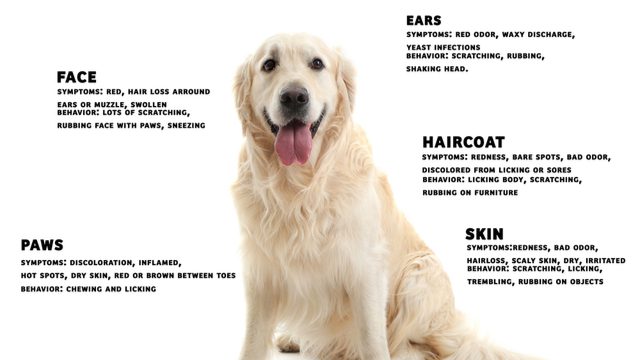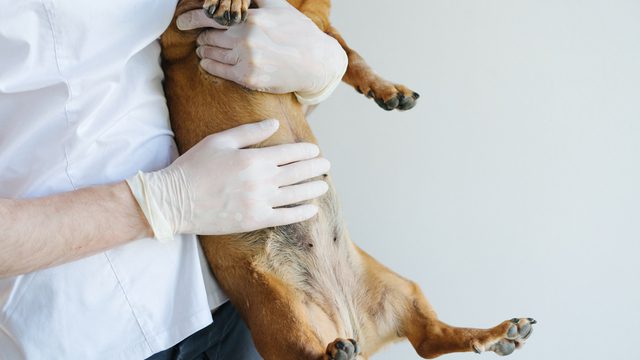Your dog may scratch or lick himself from time to time. But if your pet starts scratching, chewing, or licking himself excessively, it could indicate discomfort and irritation.
From various bacterial and fungal infections to food and environmental allergies, an array of prospective issues can lead to itching. Since your dog may start chewing, licking, or scratching himself due to many reasons, it’s better to consult a professional.
Fortunately, there are several home remedies, as well as treatments you can follow to cure your pet’s itch effectively. Here, we discuss in-depth the symptoms, causes, and medicines to relieve itchy skin in your dog:
Quick Facts about Itchy Skin for Dogs
According to a professional veterinary dermatologist John C. Angus, at least 95 to 98% of cases of itchy skin causes are because of the following reasons:
- Allergic reaction to various environmental proteins
- Bacterial infections like staphylococcal pyoderma
- Food allergy
- Parasite hypersensitivity
- Yeast infection
Why is My Dog Itching?
Watching your dog constantly biting, chewing, scratching, and licking his skin and paws can worry pet parents, especially if it happens repeatedly.
Several reasons can cause itching in dogs. These include:
Allergies
If you’ve noticed that your dog’s scratching and chewing has increased, it’s likely due to allergies. Your dog may develop allergies to environmental triggers like pollen or mold.
Apart from this, dogs may develop contact dermatitis, i.e., skin irritation when infected with pesticides.
Food Allergies
Most people fail to consider food allergies a possible cause of itching because their pet has been eating the same food its whole life. However, keep in mind that your furry friend may develop allergies to various food substances with time.
Many pet parents hold the misconception that dogs are only sensitive and allergic to low-quality food. Like us, our pets can have an allergic reaction to a particular ingredient. Therefore, food quality may not play as much of a role when the food content is inedible for your dog.
Although premium foods are free of allergy-causing food fillers, you should still check ingredients and do your research to be on the safe side.
Anxiety
Just as how humans with anxiety have a habit of twirling their hair or biting their nails, dogs may chew or bite their paws as a natural response to being upset or sad.
Recent research indicates that dogs can suffer from a condition similar to OCD (obsessive-compulsive disorder). Known as Canine Compulsive Disorder (CCD), it may manifest as licking, chewing, scratching, or self-harm.
Dry Skin
Your dog may develop patches of dry skin for numerous reasons. These include fatty acid deficiency and changing weather.
Your furry friend may start scratching, chewing, or licking its skin out of discomfort.
Hormonal Imbalance
If your pet’s body starts producing excess cortisol or inadequate amounts of thyroid hormone, it can lead to various skin infections. Your dog may begin scratching or licking, and you may notice bald spots all over its body.
Pain
To determine the underlying issue behind your dog’s licking, scratching, or chewing, make sure you factor in the possibility of physical discomfort. For example, your dog may have a stone or thorn stuck in his footpad.
They may even start chewing or scratching due to hip dysplasia, arthritis, or other orthopedic problems.
Parasites
The most prevalent cause of licking, scratching, or chewing paws and skin is parasites like fleas, mites, and ticks.
While you can easily spot ticks, fleas are harder to notice, and mites are microscopic.
Why Does My Dog ItchSpecific Areas?
If you notice your dog is continuously scratching in a specific area, you can narrow down the cause by reading the guide below:
Itchy Ears
Infections, as well as allergies, can cause itchy ears. In addition, dirt and other materials that get stuck in your dog’s ear may lead to irritation and discomfort.
Itchy Paws
Your dog’s paws may start getting itchy when he suffers from allergic reactions to pollen, food, or grass. Dirty and moist paws may also lead to itchiness and irritation.
Itchy Butt
Your furry friend’s butt may get itchy due to ringworms, fleas, allergies, impacted anal sacs, or fecal contamination.
What are the Symptoms of a Dog Itching?

It may take a while for you to figure out the reason behind your dog’s itching. For an earlier diagnosis of the underlying cause, you need to know which symptoms to look for. These include:
- A brownish-red saliva satin on its fur
- Bleeding and redness
- Constant biting, chewing, and licking
- Hair loss
- Excessive scratching in specific spots
- Odor
- Oozing pustules
- Restlessness
- Scaling of the skin
- Skin infection and irritation
Start Tracking Symptoms of Dog Itching
Just because your dog did not suffer from allergies as a puppy doesn’t mean they can’t develop them when they grow up. Consider the following questions when tracking your dog’s symptoms:
- How much does your dog usually itch?
- Does itching happen when bathing or outside?
- Does your dog itch, scratch, and lick when no fleas and mites are present
- Does your dog have a hot spot
- Do they itch during springtime or winter?
- Is your dog losing hair, bleeding, or throwing up?
- Has anything successfully soothed your dog’s discomfort?
- What symptoms of dog itching does your furry friend exhibit?
- Which days did your dog itch the most?
- Where does your dog itch?
Keep a diary of your dog’s symptoms and see if they correlate with different conditions your dog could face. Consider sharing your log with your vet so that you can get a professional opinion on the underlying cause and triggers of your dog’s allergies.
What Happens When You Don’t Treat Your Dog’s Allergic Itch?
Make sure you treat your dog’s itch as soon as you notice it. It is because waiting for too long can cause various problems like:
- Continued discomfort and pain from scratching-induced skin damage
- Disruption from its regular activities
- Hair loss, odor, redness, or sores
- Secondary bacterial and skin infections due to fungi
When Should You Contact Your Vet?

Contact your vet when you notice your dog starts scratching, licking, or chewing itself repeatedly. Itchy skin and fur are uncomfortable and painful, so you shouldn’t ignore them.
How to Treat Itchy Skin in Your Dog
Itchy skin not only causes discomfort, but it can make your dog miserable as well. If you don’t treat it in time, it may evolve into skin infections, hair loss, and hot spots.
Treating your dog’s itchy skin is the only way to alleviate symptoms and reduce the risk of it becoming worse. However, you may find it a daunting and challenging task to determine the best way to approach your furry friend’s itch.
Luckily, we’ve made a list of ways you can treat itchy skin in dogs:
Food Allergies
Certain common foods like wheat, egg, soy, beef, or lamb can cause an allergic reaction in your furry friend. Insightful research reveals that dairy, wheat, and beef are responsible for up to 80% of food allergy cases in pets.
Make sure you discuss food allergies with your veterinarian as they can provide you with recommendations for dietary supplements, dog food, and how to help your dog get started on a different diet.
The best protein sources in a hypoallergenic diet are egg, duck, venison, types of fish unavailable in most pet food. Sources of carbohydrates are peas, canned pumpkin, potatoes, and sweet potatoes. Your main goal should be to eliminate allergens and replace them with a healthy diet.
Steroids
Your veterinarian may prescribe certain steroids like dexamethasone to help treat your dog’s itch. These steroids help combat excessive itchiness, inflammation, and itch-related skin pain.
Often inflammation is caused by undiagnosed food or environmental allergies in pets. If your furry friend has acute inflammation because of allergies, a steroid injection is a great way to cure the itch. In fact, an injection is the fastest, most effective, and easiest way of delivering steroids to your pet’s body.
However, topical steroids might perform better depending on the kind of skin condition your dog suffers from. Your vet may provide you with easy-to-follow directions on how to apply the steroids to your pet.
One downside of topical steroids is that dogs tend to swallow them with their tongues. It can upset their tummy and induce various side effects. Therefore, if your dog takes steroids regularly, make sure you get their blood work checked frequently.
Give them an Oatmeal Bath
If your furry friend suffers from dry and itchy skin, consider giving them an oatmeal bath. It is a traditional way to treat itching, regardless of your dog’s skin type.
All you need is baby oatmeal cereal or regular, plain oatmeal. Simply put some oatmeal in your food processor/blender and turn it into powder.
Once your oatmeal becomes powdery, add it to a warm bath. Ensure the water is comfortably warm and not too hot since hot water can further irritate dry skin patches.
Let your dog soak in the tub for up to fifteen minutes. The oils and proteins present in the oatmeal powder will help soothe the itch. Rinse your dog off, dry them, and then allow them to continue playing again!
Epsom Salt
Another great way to cure your dog’s skin itch is with Epsom salt. A healthy and lukewarm bath with Epsom salt can soothe symptoms of itchiness in your furry friend’s coat and skin.
You may even apply heat packs on its paws to ease inflammation and sores. Epsom salt is a popular way of healing small, open sores, primarily when used with antibiotics.
Anti-Histamines
Antihistamines are a great way to treat itchy skin in your dog. In fact, according to research, an estimated 1/3rd of all owners report positive results with antihistamines. However, these medications can have different effects on different dogs.
On the flip side, the same medicine has little effect on other dogs. For this reason, pet owners should try at least three various types of antihistamines before giving up.
The most common and readily available antihistamines to treat dog allergies are:
- Atarax
- Benadryl
- Chlortrimeton
- Claritin
- Clemastine
- Zyrtec
They are a great way to cure itchy skin, especially since the side effects are low. Moreover, they are inexpensive.
Vitamin E Oil
Like us, our furry friends can also benefit from vitamin E capsules. These supplements moisten the skin and increase healthy skin oil to help repair dry, itchy patches.
With the help of vitamin E, you can speed up your dog’s healing time. It is due to Vitamin E’s moisturizing ability that can soothe irritated skin spots and reduce itchiness.
Exercise and Playtime
A dog bouncy and playful is a happy dog. If your dog runs around, walks with you, fetches, and mingles with other people and dogs, it’s less likely the itchiness is problematic.
Typically, itchiness or skin allergies make your dog cranky, and they would be suffering from extreme mood swings.
Exercise is essential to ensure your dog’s health; it makes them sweat, which is also good for their skin. However, overexercising may flare up your dog’s skin and lead to itchy patches. Although exercising doesn’t treat any skin diseases, it ensures your dog’s health and good night’s sleep.
Get Rid of Contaminated Items
If you notice that your dog’s coat and skin are covered in mites, fleas, or ticks, it’s essential that you not only wash them but also wash their bedding.
In addition, give their toys and clothes a good washing too. Remember that you use a safe, tested, eco-friendly, and nontoxic shampoo consisting of only natural organic ingredients that help alleviate psoriasis.
Medicated Shampoos
In some cases, medicated shampoos can help treat your dog’s skin conditions and hotspots. Try to clip away hair from sore areas.
This way, you can get better access to sore spots before washing your pet.
Most medicated shampoos boast antiseptics agents that can help clean wounds and assist in repairing them. It can help minimize itching and dryness. Follow proper directions to avoid causing redness or inflammation.
Love Cures It All

Playing with your dog and showering them lots of love is the best way to cure an anxious or bored dog. Proper scrubbing, bathing, and regular grooming are great ways to keep your dog’s fur and skin clean and parasite-free.
Make sure you give your dog a proper bath twice a month and use a gentle shampoo to groom its fur. Your best option is an oatmeal-based shampoo to ease its itch.
Lastly, be proactive and always check your dog’s fur and skin after playing in grassy and woody areas. This way, you can find ticks, mites, and fleas before they start causing discomfort in your adorable pet.
Conclusion
Finding the exact source irritating your dog’s skin can be an exhaustive, daunting process. However, dog owners can learn more about what’s making them itch by tracking their dog’s behavior and symptoms. Proper diagnostics and medication are essential to treat itchy skin among dogs.
Keep in mind that effective and successful management of an allergic dog is a complicated and frustrating task. It is because caring for an atopic pet requires multi-mode management to avoid and control allergic flare-ups.
A careful diagnosis by a veterinarian and compliance to necessary follow-up care is required to alleviate itchiness and treat its underlying cause. Failure to treat itch may lead to deep and open wounds.
Avoid this by getting a proper assessment of your dog via a blood test, allergy test, and a skin scrape to pinpoint the exact cause. Apart from that, you may follow the above-mentioned home remedies to cure and treat your dog’s itch.
Sources:
https://burtsrx.com/11-remedies-dogs-skin-problems/
https://www.itchingforhelp.com/treatment-option.aspx
https://animalmedcenter.com/canine-allergic-dermatitis/
https://www.greatpetcare.com/wellness/itch-relief-for-dogs/
https://bryanhightvet.com/common-reasons-your-dog-has-itchy-skin/
https://www.akc.org/expert-advice/health/the-itchy-dog-scratching-the-surface/
https://thedogproblems.com/14-home-remedies-dog-skin-allergies-itching/?amp
https://pets.webmd.com/dogs/guide/dogs-and-compulsive-scratching-licking-and-chewing#2
https://azestfor.com/pages/itchy-dog-remedies#give-your-dog-an-epsom-salt-or-oatmeal-bath


